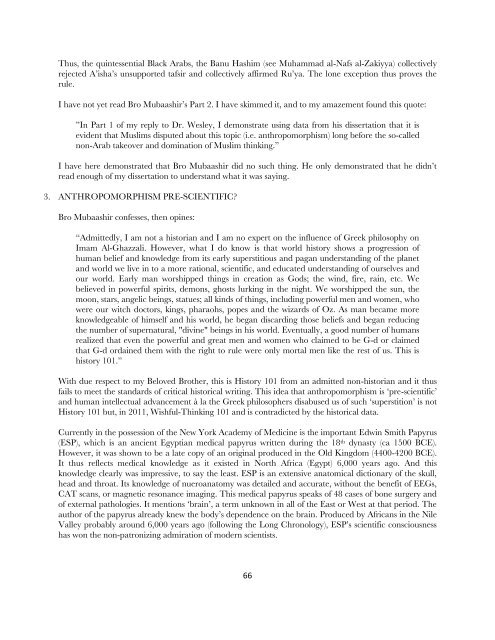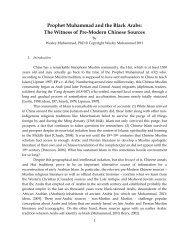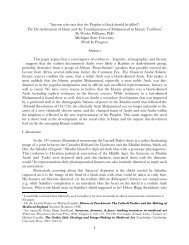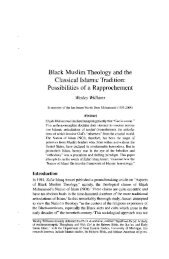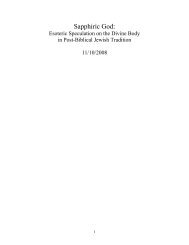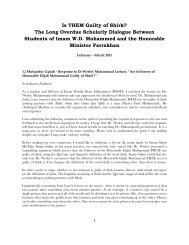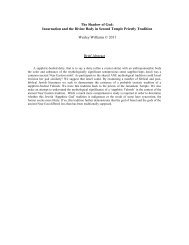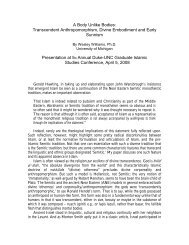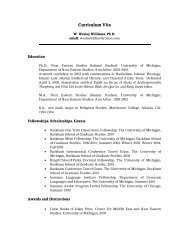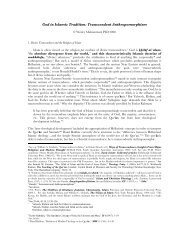Is THEM Guilty of Shirk? - Dr. Wesley Muhammad
Is THEM Guilty of Shirk? - Dr. Wesley Muhammad
Is THEM Guilty of Shirk? - Dr. Wesley Muhammad
You also want an ePaper? Increase the reach of your titles
YUMPU automatically turns print PDFs into web optimized ePapers that Google loves.
Thus, the quintessential Black Arabs, the Banu Hashim (see <strong>Muhammad</strong> al-Nafs al-Zakiyya) collectively<br />
rejected A‘isha‘s unsupported tafsir and collectively affirmed Ru‘ya. The lone exception thus proves the<br />
rule.<br />
I have not yet read Bro Mubaashir‘s Part 2. I have skimmed it, and to my amazement found this quote:<br />
‖In Part 1 <strong>of</strong> my reply to <strong>Dr</strong>. <strong>Wesley</strong>, I demonstrate using data from his dissertation that it is<br />
evident that Muslims disputed about this topic (i.e. anthropomorphism) long before the so-called<br />
non-Arab takeover and domination <strong>of</strong> Muslim thinking.‖<br />
I have here demonstrated that Bro Mubaashir did no such thing. He only demonstrated that he didn‘t<br />
read enough <strong>of</strong> my dissertation to understand what it was saying.<br />
3. ANTHROPOMORPHISM PRE-SCIENTIFIC?<br />
Bro Mubaashir confesses, then opines:<br />
―Admittedly, I am not a historian and I am no expert on the influence <strong>of</strong> Greek philosophy on<br />
Imam Al-Ghazzali. However, what I do know is that world history shows a progression <strong>of</strong><br />
human belief and knowledge from its early superstitious and pagan understanding <strong>of</strong> the planet<br />
and world we live in to a more rational, scientific, and educated understanding <strong>of</strong> ourselves and<br />
our world. Early man worshipped things in creation as Gods; the wind, fire, rain, etc. We<br />
believed in powerful spirits, demons, ghosts lurking in the night. We worshipped the sun, the<br />
moon, stars, angelic beings, statues; all kinds <strong>of</strong> things, including powerful men and women, who<br />
were our witch doctors, kings, pharaohs, popes and the wizards <strong>of</strong> Oz. As man became more<br />
knowledgeable <strong>of</strong> himself and his world, he began discarding those beliefs and began reducing<br />
the number <strong>of</strong> supernatural, "divine" beings in his world. Eventually, a good number <strong>of</strong> humans<br />
realized that even the powerful and great men and women who claimed to be G-d or claimed<br />
that G-d ordained them with the right to rule were only mortal men like the rest <strong>of</strong> us. This is<br />
history 101.‖<br />
With due respect to my Beloved Brother, this is History 101 from an admitted non-historian and it thus<br />
fails to meet the standards <strong>of</strong> critical historical writing. This idea that anthropomorphism is ‗pre-scientific‘<br />
and human intellectual advancement à la the Greek philosophers disabused us <strong>of</strong> such ‗superstition‘ is not<br />
History 101 but, in 2011, Wishful-Thinking 101 and is contradicted by the historical data.<br />
Currently in the possession <strong>of</strong> the New York Academy <strong>of</strong> Medicine is the important Edwin Smith Papyrus<br />
(ESP), which is an ancient Egyptian medical papyrus written during the 18 th dynasty (ca 1500 BCE).<br />
However, it was shown to be a late copy <strong>of</strong> an original produced in the Old Kingdom (4400-4200 BCE).<br />
It thus reflects medical knowledge as it existed in North Africa (Egypt) 6,000 years ago. And this<br />
knowledge clearly was impressive, to say the least. ESP is an extensive anatomical dictionary <strong>of</strong> the skull,<br />
head and throat. Its knowledge <strong>of</strong> nueroanatomy was detailed and accurate, without the benefit <strong>of</strong> EEGs,<br />
CAT scans, or magnetic resonance imaging. This medical papyrus speaks <strong>of</strong> 48 cases <strong>of</strong> bone surgery and<br />
<strong>of</strong> external pathologies. It mentions ‗brain‘, a term unknown in all <strong>of</strong> the East or West at that period. The<br />
author <strong>of</strong> the papyrus already knew the body‘s dependence on the brain. Produced by Africans in the Nile<br />
Valley probably around 6,000 years ago (following the Long Chronology), ESP‘s scientific consciousness<br />
has won the non-patronizing admiration <strong>of</strong> modern scientists.<br />
66


